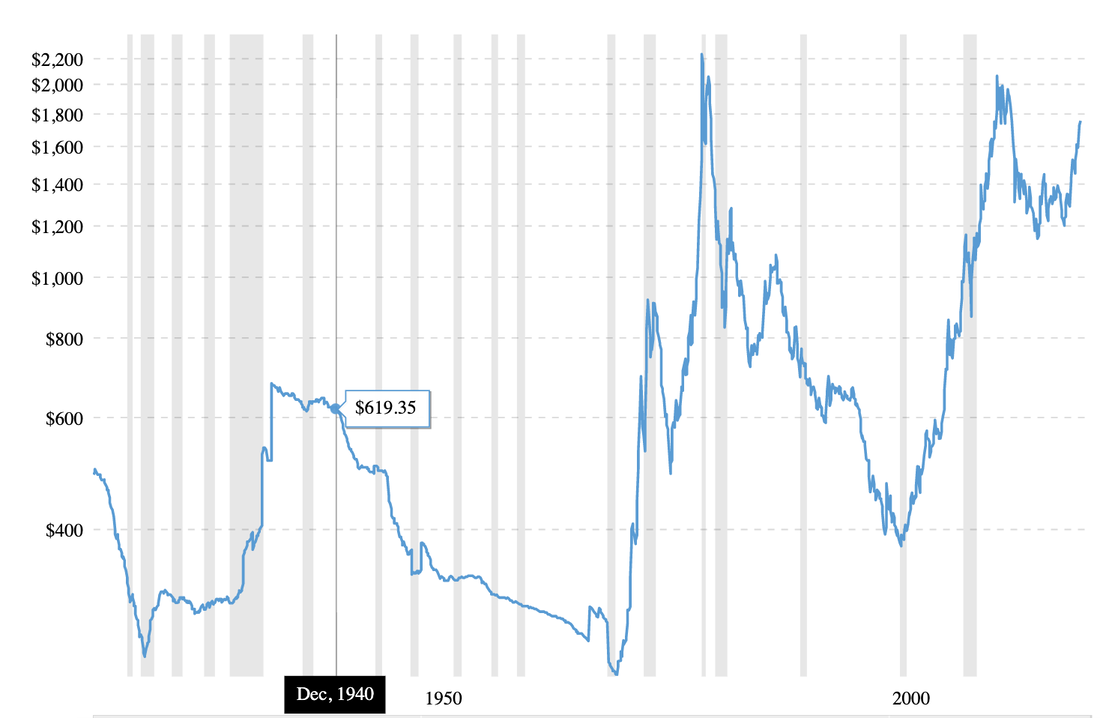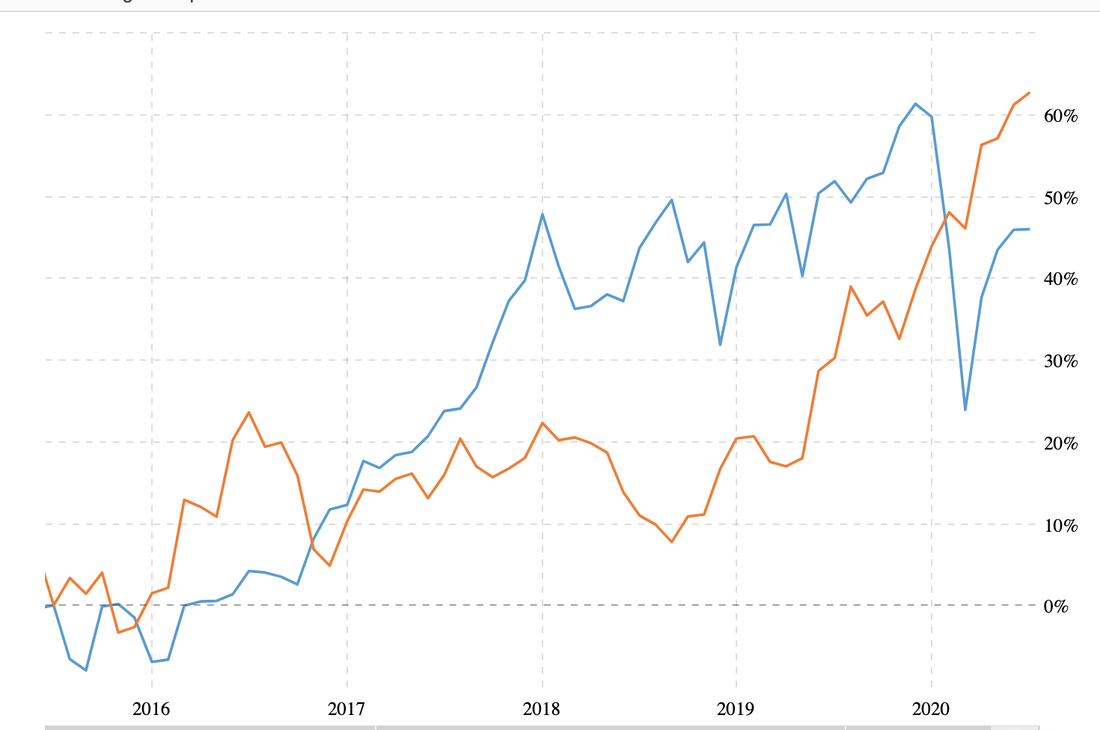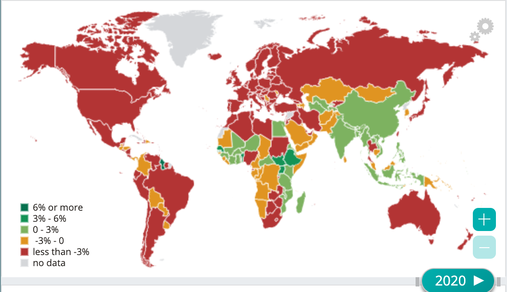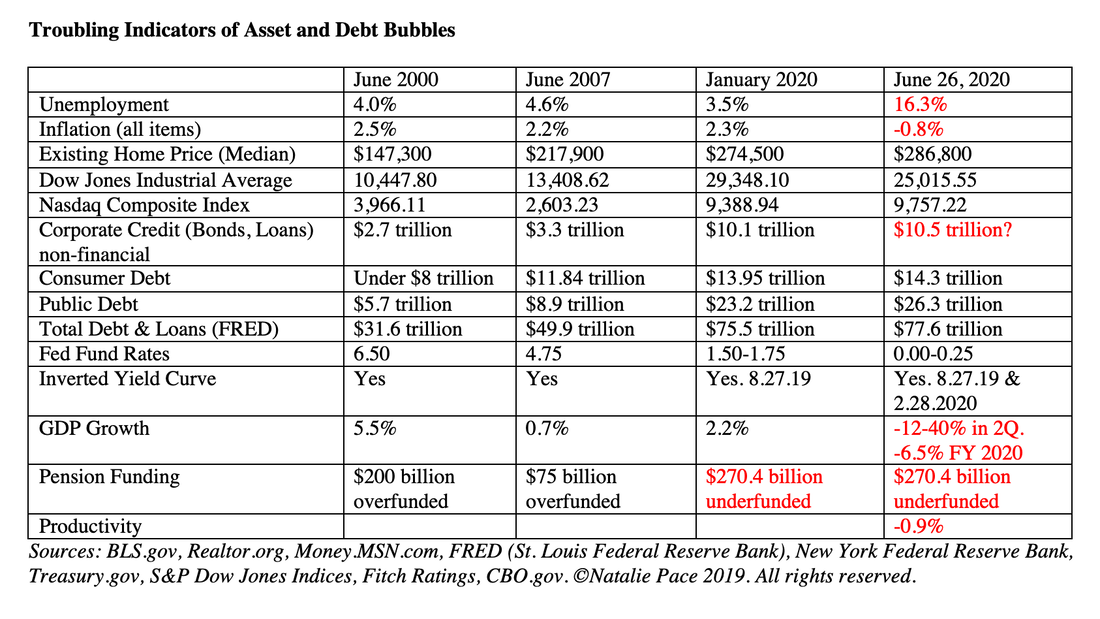|
Gold is on a tear. The price of gold ($1775/ounce) has exploded with gains of 55% since it hit a 5-year low of $1146.85 in November of 2015. Will it blow past its all-time high of $1895/ounce, set in September of 2011 after the U.S. was stripped of AAA status by Standard and Poor’s? Or will it drop like a rock and stay there, like gold prices did in 1980, after hitting an inflation-adjusted high of $2,235? Is silver a better bet now? Let’s Examine: Gold’s Relationship with Stocks Gold ETFs and Index Fund Risk Mutual Fund Redemption Suspensions COVID-19 Gold Miners Risk Relationship with Monetary Supply Gold/Silver Relationship and Price And here’s a little more color on each topic. Gold’s Relationship with Stocks Historically, and over the past 5-10 years, gold has had an inverse relationship with stocks. When stocks drop, gold soars, and, vice versa, when investors swoon over stocks, gold sinks. The metals are volatile. They spend decades slumbering and then soar. ETFs and Index Fund Risk In early March, when the Dow Jones Industrial Average lost 35%, gold miner stocks, like the ETF RING, lost 46%. The leveraged 3X gold miners bull fund NUGT dropped almost 90%, with the majority of the losses concentrated between March 10th and March 13th. Gold dropped 12% between March 6 and March 19, 2020, but stabilized by April 7, 2020. Both gold prices and RING are at 5-year highs. NUGT is still off 66%. On March 15, 2020, the Federal Reserve Board had an emergency meeting. They cut interest rates to zero, and injected liquidity into a number of markets – including ETFs – that had frozen up. According to Jerome Powell, the chairman of the Federal Reserve Board, in his press conference on March 15, 2020, “In the past week, several important financial markets, including the market for U.S. Treasury securities, have at times shown signs of stress and impaired liquidity.” The Federal Reserve Board has been purchasing (rescuing) ETFs. Gold ETFs have not shown up on the list. A fund company can get into trouble with products unrelated to gold that impact the liquidity in all of its products. MF Global, which declared bankruptcy in 2011 due to the Greek bond bailout, took the company’s gold investors down with it, even though gold prices were at an all-time high. (The NY Times reported in 2013 that investors were made 100% whole, however.) Direxion Funds had a GUSH 3X Oil Bull Fund (which is now a 2X fund). It’s very likely that the implosion of that fund was the culprit behind the NUGT free fall and splat. Mutual Fund Redemption Suspensions 2020 has seen a spate of redemption suspensions of global mutual funds, mostly in Europe. However, there are funds in the U.S. that allow this, too. In 2017, money market funds adopted redemption gates and liquidity fees as a way to prevent a run on the bank. GLD, the largest gold ETF in the world, can suspend redemptions. The Coronavirus Recession has already proven to prompt a rapid increase in redemption suspensions. So, it is important to be aware of the risk in all funds, including gold funds, given the global recession. COVID-19 Gold Miners Risk Several gold mines had mining operations suspended due to the coronavirus in the 2nd quarter of this year. The time periods of the closures vary by company and country. However, the impact is widespread. Many South American countries that are rich in natural resources have been heavily, negatively, impacted from the virus. This will reduce production for the 2nd quarter of 2020 and operational results. So, even though RING is back near a 5-year high at $30/share, it’s very possible that the upcoming earnings season will hit all of the miners, and gold and silver mining ETFs. The higher price of gold will be a positive, once production gets back on track. Relationship with Monetary Supply “Inflation is always and everywhere a monetary phenomenon in the sense that it is and can be produced only by a more rapid increase in the quantity of money than in output.” Milton Friedman. Of late, we have been far more concerned with deflation. We’ve seen oil prices turn negative. The Consumer Price Index was down -0.1% in May of 2020, according to the Bureau of Labor Statistics. However, consumer prices for food at home jumped 4.9% year-over-year. Home prices are unaffordable in 2/3rds of U.S. cities. Health care costs have gone astronomical, while wages have stagnated for decades. Stocks are higher than ever. Debt is astronomical. Home prices and stock prices don’t get included in the CPI because they are assets, and thus a part of your wealth. However, that wealth is leveraged, and we saw home prices drop by half in the last recession. Additionally, there are still 3.5 million homes that are severely underwater – even now, with real estate at all-time highs. That is why mortgage-backed securities are still a problem that had to be bailed out March 15, 2020, when the Federal Reserve Board came marching in to try and save the economy. Meanwhile, we’ve never seen this much paper floating around. The public debt is $26.4 trillion. Consumer debt is $14.3 trillion. And the total U.S. debt and loans has now topped $77.6 trillion. All of this leverage is astonishingly high – far more in the stratosphere than it was in the unprecedented Great Recession. U.S. leverage was already at alarming levels before the coronavirus began to impact the economy. Incidentally, the late 1970s, when gold prices soared to their all-time high (higher on an inflation-adjusted basis than today’s gold price), is a period known as The Great Inflation. According to Michael Bryan of the Federal Reserve Bank of Atlanta, “The origins of the Great Inflation were policies that allowed for an excessive growth in the supply of money—Federal Reserve policies.” The Feds have justified the most recent infusion of liquidity as necessary to prevent an entire freeze-up of several paper assets from T-Bills to mutual funds, ETFs, bonds, U.S. dollars and more, particularly in the highly leveraged bond and mortgage-backed securities markets. The real question is why didn’t they tighten money supply before the recession? Why didn’t they fix the roof while the sun was still shining? Gold/Silver Relationship and Price Between 1970 and 1980, the value of gold increased over three-fold. Silver soared by a factor of seven. Between 2000 and the all-time high in September of 2011, gold increased five-fold. Silver popped almost eight-fold. Gold and silver both gain favor when people lose confidence in the purchasing power of their dollars. In the late 70s, that was due to the Great Inflation (and the U.S. being awash in paper money). Today, the U.S. is again swimming in paper. If you look at assets (real estate and stocks), health care costs and debt, we have run-away inflation. The prices are in bubble land, and are vulnerable to massive losses, just as they were in 2008 and 2000. (Low interest rates create bubbles.) Currently, gold is hovering very close to the September 2011 high. Silver is still 68% lower than its highs set back in 2011. So, silver appears to be the better value. Both precious metals should rally when people get concerned about the dollar or the amount of paper money in the system. Nations like China and Russia have been building up their gold reserves. The easiest way to invest is through ETFs. However, as noted above, there is an increased risk to that. What’s Your Best Strategy? Given the volatility in silver and gold, it’s best not to bet the farm on these precious metals. After the peak, the prices tend to drop like a knife and slumber there for decades. However, you can definitely make a case for having a slice or two of gold and silver in your investment plan. The trick is how to play that. In the past, I would have just gone in with RING or NUGT. However, the liquidity crisis of March 2020 teaches us that funds have their own problems that can severely and negatively impact the performance of the gold. Direxion’s 3X gold miners bull fund is now a 2X fund, and it is not living up to its name and mandate in the least. Physical gold is increasing in value alongside the price of gold. However, it comes with all of the challenges of owning coins, bars and bullion, including insurance, storage, the threat of theft and the possibility of being swindled or preyed upon. If you’re willing to invest the time and expertise to get this right, then holding physical gold, in moderation, could pay off. In a world where there is just too much paper floating around, hard assets should hold their value better. However, in the Apocalypse, it will likely be easier to trade a loaf of bread, a bottle of water or perhaps even an Internet connection than a gold coin. So, don’t bet everything on gold. A good plan is always diversified. Tune into a playback of my free gold videoconference for additional information. If you don’t know what you own, or how protected your wealth and retirement are, our Investor Educational Retreat or an unbiased 2nd opinion can offer you the information and wisdom you need now. Call 310-430-2397 or email [email protected] to learn more. Click on the banner ad below for additional information on the Oct. 2-4, 2020 Online Financial Empowerment Retreat. "Many people, including educated men and women, often get into trouble when they neglect to follow simple and fundamental rules of the type provided [by Natalie]. This is why I recommend them with enthusiasm." Professor Gary S. Becker. Dr. Becker won the 1992 Nobel Prize in economics for his theories on human "College students need this information before they get their first credit card. Young adults need it before they buy their first home. Empty nesters can use the information to downsize to a sustainable lifestyle, before they get into trouble." Joe Moglia, Chairman, TD AMERITRADE. Other Blogs of Interest Will the Facebook Ad Boycott De-FANG Stocks? Why Did My Cannabis Stock Go Down? Which Countries Are Hot in a Global Pandemic? Is Your Financial Advisor Good at Navigating Stormy Seas? $10 Avocados, Lies, Damn Lies, Statistics & Wall Street Secrets. It's Never a Crash. Work From Home and Intergenerational Housing. Biotech Races for a Coronavirus Cure. Are You Worried About Money? May is a Good Time for Rebalancing. Is FDIC-Insured Cash at Risk of a Bank Bail-in Plan? Why Did my Bonds Lose Money? Cannabis Update. Recession Proof Your Life. Free Videocon Monday, May 10, 2020. The Recession will be Announced on July 30, 2020. Apple Reports Terrible Earnings. We Are in a Recession. Unemployment, Rising Stocks. What's Going On? 8 Money Myths, Money Pits, Scams and Conspiracy Theories. 21st Century Solutions for Protecting Your Home, Nest Egg & Job. Wall Street Insiders are Selling Like There is No Tomorrow. Why Are My Bonds Losing Money? Tomorrow is Going to be Another Tough Day. Price Matters. Stock Prices are Still Too High. Should You Ride Things Out? 7 Recession Indicators Corona Virus Update. The Bank Bail-in Plan on Your Dime. NASDAQ is Up 6X. CoronaVirus: Which Companies and Countries Will be Most Impacted. Is Tesla Worth GM and Ford Combined. Artificial Intelligence is on Fire. Is it Time to Buy S'More? Take the Retirement Challenge. 2020 Investor IQ Test. Answers to the 2020 Investor IQ Test. The Cannabis Capital Crunch and Stock Meltdown. Does Your Commute Pollute More Than Planes? Are Health Care Costs Killing Your Budget? 2020 Crystal Ball. The Benefits of Living Green. Featuring H.R.H. The Prince of Wales' Twin Eco Communities. What Love, Time and Charity Have to do with our Commonwealth. Interview with MacArthur Genius Award Winner Kevin Murphy. Unicorns Yesterday. Fairy Tales Today. IPO Losses Top $100 Billion. Counting Blessings on Thanksgiving. Real Estate Prices Decline. Hong Kong Slides into a Recession. China Slows. They Trusted Him. Now He Doesn't Return Phone Calls. Beyond Meat's Shares Dive 67% in 2 Months. Price Matters. Will There be a Santa Rally? It's Up to Apple. Will JP Morgan Implode on Fairy Tales and Unicorns. Harness Your Emotions for Successful Investing. What the Ford Downgrade Means for Main Street. The Dow Dropped Over 1000 Points Do We Talk Ourselves into Recessions? Interview with Nobel Prize Winning Economist Robert J. Shiller. Ford is Downgraded to Junk. From Buried Alive in Bill to Buying Your Own Island. The Manufacturing Recession. An Interview with Liz Ann Sonders. Gold Mining ETFs Have Doubled. The Gold Bull Market Has Begun. The We Work IPO. The Highs and Hangovers of Investing in Cannabis. Recession Proof Your Life. China Takes a Bite Out of Apple Sales. Will the Dow Hit 30,000? A Check Up on the Economy Red Flags in the Boeing 2Q 2019 Earnings Report The Weakening Economy. Think Capture Gains, Not Stop Losses. Buy and Hold Works. Right? Wall Street Secrets Your Broker Isn't Telling You. Unaffordability: The Unspoken Housing Crisis in America. Are You Being Pressured to Buy a Home or Stocks? What's Your Exit Strategy? It's Time To Do Your Annual Rebalancing. Cannabis Crashes. Should You Get High Again? Are You Suffering From Buy High, Sell Low Mentality? Financial Engineering is Not Real Growth. The Zoom IPO. 10 Rally Killers. Fix the Roof While the Sun is Shining. Uber vs. Lyft. Which IPO Will Drive Returns? Boeing Cuts 737 Production by 20%. Earth Gratitude This Earth Day. Real Estate is Back to an All-Time High. The Lyft IPO Hits Wall Street. Should you take a ride? Cannabis Doubles. Did you miss the party? 12 Investing Mistakes Drowning in Debt? Get Solutions. CBD Oil for Sale. The High Cost of Free Advice. Apple's Real Problem in China: Huawei. 2018 is the Worst December Since the Great Depression. Will the Feds Raise Interest Rates? Should They? Learn what you're not being told in the MSM. Why FANG, Banks and Your Value Funds Are in Trouble. Russia Dumps Treasuries and Buys Gold OPEC and Russia Cut Oil Production. Important Disclaimers Please note: Natalie Pace does not act or operate like a broker. She reports on financial news, and is one of the most trusted sources of financial literacy, education and forensic analysis in the world. Natalie Pace educates and informs individual investors to give investors a competitive edge in their personal decision-making. Any publicly traded companies or funds mentioned by Natalie Pace are not intended to be buy or sell recommendations. ALWAYS do your research and consult an experienced, reputable financial professional before buying or selling any security, and consider your long-term goals and strategies. Investors should NOT be all in on any asset class or individual stocks. Your retirement plan should reflect a diversified strategy, which has been designed with the assistance of a financial professional who is familiar with your goals, risk tolerance, tax needs and more. The "trading" portion of your portfolio should be a very small part of your investment strategy, and the amount of money you invest into individual companies should never be greater than your experience, wisdom, knowledge and patience. Information has been obtained from sources believed to be reliable. However, NataliePace.com does not warrant its completeness or accuracy. Opinions constitute our judgment as of the date of this publication and are subject to change without notice. This material is not intended as an offer or solicitation for the purchase or sale of any financial instrument. Securities, financial instruments or strategies mentioned herein may not be suitable for all investors. 12/10/2020 03:47:34 am
Thank you for sharing the post! I hope to see more updates from you. Comments are closed.
|
AuthorNatalie Pace is the co-creator of the Earth Gratitude Project and the author of The Power of 8 Billion: It's Up to Us, The ABCs of Money, The ABCs of Money for College, The Gratitude Game and Put Your Money Where Your Heart Is. She is a repeat guest & speaker on national news shows and stages. She has been ranked the No. 1 stock picker, above over 830 A-list pundits, by an independent tracking agency, and has been saving homes and nest eggs since 1999. Archives
July 2024
Categories |












 RSS Feed
RSS Feed